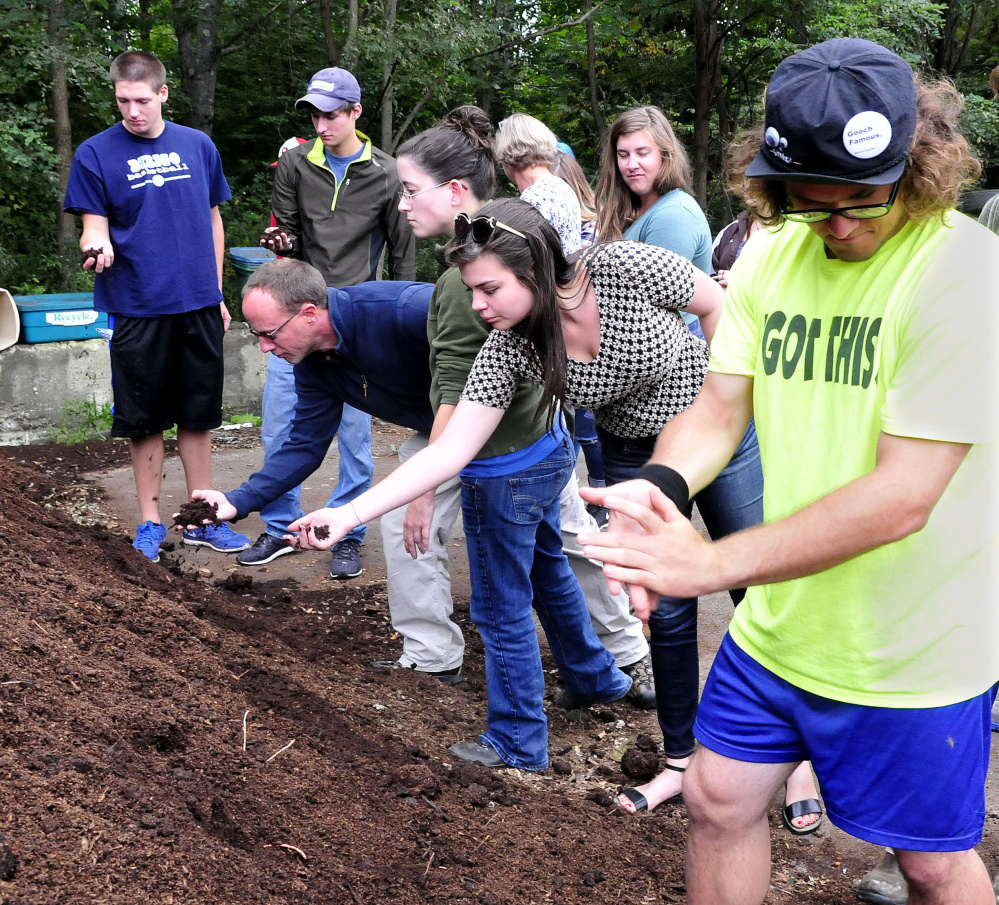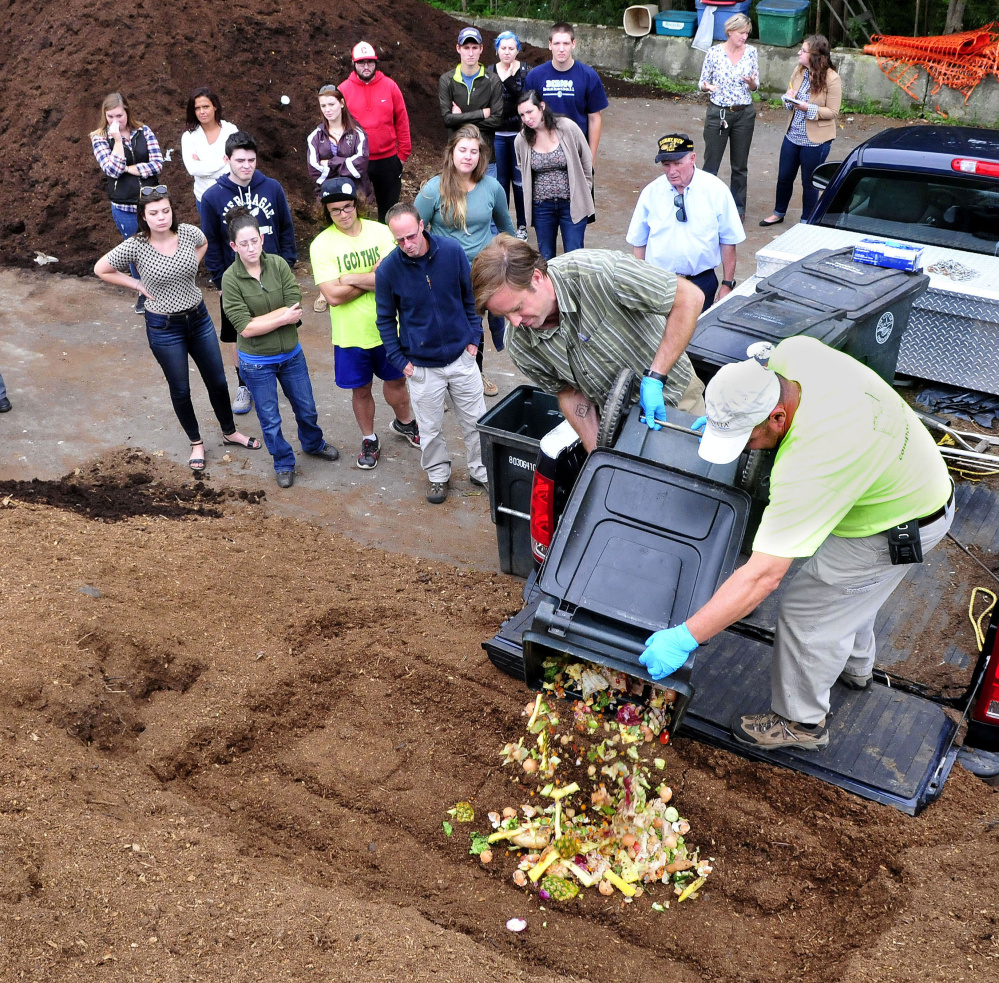At first glance, the compost slab at the recently formed Farmington Compost Cooperative looks like any other pile of black gold soil, but once you start talking to the volunteers who have made this public mission a personal one, the magnitude of community involvement that has been at the center of turning food scraps and animal amendments into a sustainable agriculture solution for Farmington begins to set in.
“We’re trying to collectively manage something that will be sustainable,” Luke Kellett, University of Maine at Farmington sustainability coordinator and professor, said Tuesday afternoon as he watched a group of UMF students learn firsthand the work that goes into organic composting.
Other Maine municipalities, such as Skowhegan, and postsecondary schools, such as the University of Maine in Orono, have taken on their own sustainable composting projects, but the Farmington Compost Cooperative is the first collaborative composting project in the state to involve a municipal government, a university and the public, according to Mark King, an environmental specialist from the Maine Department of Environmental Protection and a UMF graduate — and it’s taken a lot of generosity to get them there.
The cooperative was formed after the Sandy River Recycling Association closed. The association served the Farmington area for 23 years as a nonprofit recycling operation. When the association closed in June 2014, King wasn’t satisfied with letting its compost operation fall by the wayside.
After approaching the recycling association about his concerns, he was able to convince the group to donate the property with the concrete compost slab to the town. He credits community member Tom Eastler, a retired UMF professor and owner of Sunny View Farm, and Kellett as “his saviors” for getting the town and UMF involved in the cooperative after King had the site secured.
Eastler took the idea of a compost cooperative that would be accessible for public use to town officials, and the town agreed to take on the property ownership, with one caveat: It would not supply any funding for the project. Eastler, determined to see the project through, paid $288 out of his own pocket for the license needed to keep the compost operation going. Once the license was acquired, the town gave the cooperative two years to succeed, or it would give up the property.
“They gave us two years, and we beat it in about a year and a half,” Eastler said.
Through the donation of food scraps from UMF and the Mt. Blue Regional School District via Aramark food service and the donation of horse manure and wood shavings from Farmington resident Bob Cushing, the cooperative receives a sufficient amount of raw materials to keep the composting project going.
On top of providing about 32 tons of food scraps last year, UMF is aiding the cooperative further with manpower. Students from its Sustainable Campus Coalition have been volunteering on Mondays, Wednesdays and Fridays to sort noncompostable materials out of the food scraps. UMF Facilities Management also has provided transport for the raw materials by allowing the cooperative to use their dump trucks when needed.
UMF is voluntarily providing the assistance, but Kellet says the university is ultimately saving money and the Earth by not using traditional food disposal methods.
“Last year we composted probably 30 to 50 tons of food waste,” Kellet said. “We’ve been able to divert this waste from (landfills).”
Once food waste has been sorted, it then goes onto the working pile of compost. Eastler uses the John Deere tractor he donated to the cooperative to cover and incorporate the food scraps with the surrounding soil.
Then the science gets to work.
According to King, once the scraps meet the manure and wood-shavings, the necessary components of carbon, nitrogen, oxygen and moisture begin to work together to create a nutrient-rich soil. When the compost is ready depends on the size of the pile, but a pile is completely composted when it reaches an internal temperature of 80 to 90 degrees, and it is then ready to be sold.
The cooperative is selling the compost for $12 per tractor bucket on selected Saturdays. A sale in June brought in about $1,000 for the cooperative. A sale earlier this month brought in $477, though Eastler believes that could have been more if rain hadn’t discouraged the public from coming.
While the last year and a half has been prosperous for the cooperative, its future depends on its ability to bring in and educate more of the public, King said. To keep up with the demand for compost, the cooperative is going to need more raw materials. King is urging the public to donate food scraps, manure or machinery, as Eastler has done.
King said UMF’s Sustainable Campus Coalition is going to start engaging in community outreach for the cooperative, forming relationships with local businesses to have them bring in any scraps or other raw materials.
“This whole thing is operated by a lot of people chipping in together through a partnership,” King said. “We’ve got to make good on making it work.”
Lauren Abbate — 861-9252
Twitter: @Lauren_M_Abbate
Send questions/comments to the editors.




